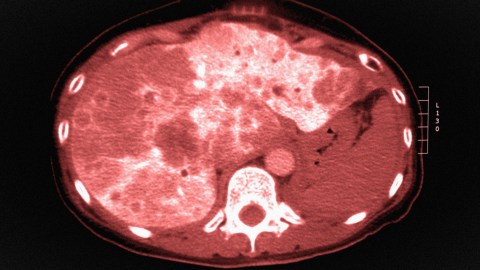American Cancer Society says people should begin screening for colon, rectal cancer at 45

People should begin screening for colon cancer earlier than previously recommended, at age 45 instead of 50, the American Cancer Society said Wednesday.
The change comes in the wake of research showing a 51 percent increase in colorectal cancer among people under 50 since 1994, and an accompanying rise in deaths.
“When we began this guideline update, we were initially focused on whether screening should begin earlier in racial subgroups with higher colorectal cancer incidence, which some organizations already recommend,” said Richard Wender, chief cancer control officer for the American Cancer Society.
Colon cancer is known to disproportionately affect African-Americans, Alaska Natives, and American Indians.
“But as we saw data pointing to a persistent trend of increasing colorectal cancer incidence in younger adults, including American Cancer Society research that indicated this effect would carry forward with increasing age, we decided to reevaluate the age to initiate screening in all US adults.”
The research shows that people born around 1990 are twice as likely to develop colon cancer and four times as likely to develop rectal cancer compared to adults born around 1950, according to a report published in CA: A Cancer Journal for Clinicians.
In the U.S., colorectal cancer, which includes both colon and rectal cancers, is the second leading cause of cancer-related death, and it’s estimated to claim 50,630 lives in 2018.
Alarmingly, no one’s sure what’s causing cancer rates to spike.
“We just have to face reality,” Dr. Richard Wender, chief cancer control officer of the society, told NPR. “We just don’t know why it’s increasing.”
What’s more, the data don’t seem to be the result of bias or improved screening technology.
“The rates of screening right now under the age of 50 are negligible. Therefore, what we’ve observed with the rising incidence is not simply a result of detection bias,” Dr. George Chang, chief of colorectal surgery at MD Anderson Cancer Center in Houston, who was not involved in the updated guidelines, told CNN. “This appears to be a real phenomenon.”
More research is needed before the medical community can determine what’s causing cancer rates to rise. Still, there are some likely explanations.
“There are a number of things that have changed over the past several decades that have to do with exposures and lifestyle,” Chang said. “We know that obesity’s associated with an increased incidence of many cancers, including colorectal cancer, and the obesity epidemic remains an important and growing problem in the US. So that may be one associated factor.”
The researchers of the new report conducted a systematic review of various colorectal cancer screening methods to see what’s most effective. They found several strategies to be effective, starting at age 45:
- A colonoscopy every 10 years
- A computed tomography colonography or “virtual colonoscopy” every five years
- A flexible sigmoidoscopy every five years
- A multitarget stool DNA test every three years
- A take-home fecal immunochemical test annually, or a take-home high-sensitivity guaiac fecal occult blood test annually
The best thing adults can do is pay close attention to their body and bowel habits, Chang said.
“Even if you’re younger, if you’re noticing that there’s a change in your bowel habits or your stools and that something isn’t right, then see your doctor,” he said. “That’s the public health statement, which is, pay attention to your bowels, and seek medical care if things don’t seem right, if there’s blood in your stools or your bowel habits change suddenly.”





